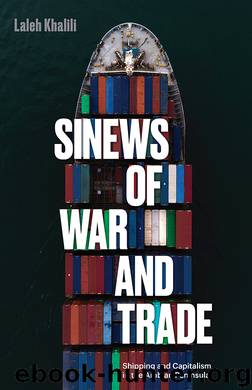Sinews of War and Trade by Laleh Khalili

Author:Laleh Khalili
Language: eng
Format: epub
Publisher: Verso Books
The Technopolitics of Managing Ports
LinkedIn is useful as a research tool in maritime businesses because it clearly reveals a few trends in the management of ports. First, professional circuits often inaugurate in the ports and terminals of northwest Europe and eventually end in those of the Arabian Peninsula. Port and terminal-operation managerial expertise thus travels from Europe, where regulations are tighter, pay comparatively lower, and unions more fractious. If, in a previous age, the metropolitan governments were invested in placing their technical experts in positions of influence in the Middle East, today the eastward movement of this managerial class is facilitated by the westward movement of maritime transport capital. Today, eight out of ten of the largest container-terminal operators in the world are headquartered in Asia and the Middle East (see Table 1.2). As Dubai Ports World invests in terminals in Rotterdam and London and elsewhere in Europe and North America (not to mention innumerable ports in the global South), it also provides a conduit amenable to the movement of technical and managerial experts from shipping hubs in the global North to the Middle East. British colonial migratory practices also still echo through management structures. South and Southeast Asian technical experts, engineers, and clerical workers fill the managerial middle ranks in these Peninsula’s maritime businesses. But South Asians also fill top managerial positions in finance or operations – both of which require technocratic expertise.
The workings of Oman’s ports illustrate the geography of expertise and management. The port of Sohar is operated by a joint venture between the Omani government and the Port of Rotterdam (a semi-public, corporatised body in charge of managing Rotterdam, Sohar, Porto in Brazil, and Kuala Tanjung in Malaysia). The container terminal is managed by Hutchison, a Hong Kong–based firm incorporated in the British Virgin Islands. The CEO of the port is British, while most of the rest of the management team are Omanis (as required by Omanisation laws). The port of Duqm in Oman is managed by a consortium between the government and the port of Antwerp. The container-terminal manager for the port of Salalah is a consortium in which the senior partner is the Dutch/Danish APM Terminals (the third-largest terminal operator in the world and the only operator on the top-ten list headquartered in Europe). The CEO of the terminal-operation business in Salalah is British, while his deputy is a US-educated Dhofari. The harbourmaster is a former captain of the Indian Navy. Salalah is touted as one of the most successful examples of labour localisation programmes on the Peninsula; around half of its mid- and top-level managers are Omanis.
While container terminals are managed by transnational firms, most oil and chemical terminals are owned and operated by petroleum and petrochemical companies. Deb Cowen describes the complexity of the maritime logistical system as ‘an extraordinary apparatus of management that is neither just public nor private and neither military nor civilian but something else’.87 The descriptor could as easily apply to the management processes of ports and container, bulk, and oil/petrochemical terminals.
Download
This site does not store any files on its server. We only index and link to content provided by other sites. Please contact the content providers to delete copyright contents if any and email us, we'll remove relevant links or contents immediately.
| Arms Control | Diplomacy |
| Security | Trades & Tariffs |
| Treaties | African |
| Asian | Australian & Oceanian |
| Canadian | Caribbean & Latin American |
| European | Middle Eastern |
| Russian & Former Soviet Union |
The Secret History by Donna Tartt(16624)
The Social Justice Warrior Handbook by Lisa De Pasquale(11489)
Thirteen Reasons Why by Jay Asher(7788)
This Is How You Lose Her by Junot Diaz(5773)
Weapons of Math Destruction by Cathy O'Neil(5037)
Zero to One by Peter Thiel(4824)
The Myth of the Strong Leader by Archie Brown(4789)
Promise Me, Dad by Joe Biden(4447)
Beartown by Fredrik Backman(4419)
Stone's Rules by Roger Stone(4415)
How Democracies Die by Steven Levitsky & Daniel Ziblatt(4399)
The Fire Next Time by James Baldwin(4343)
100 Deadly Skills by Clint Emerson(4079)
A Higher Loyalty: Truth, Lies, and Leadership by James Comey(4033)
Rise and Kill First by Ronen Bergman(4012)
The David Icke Guide to the Global Conspiracy (and how to end it) by David Icke(3882)
The Farm by Tom Rob Smith(3872)
Secrecy World by Jake Bernstein(3782)
The Doomsday Machine by Daniel Ellsberg(3731)
